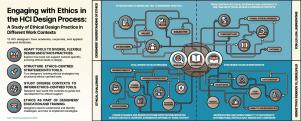Engaging with ethics in the HCI design process: A study of ethical design practice in different work contexts
IF 5.1
2区 计算机科学
Q1 COMPUTER SCIENCE, CYBERNETICS
International Journal of Human-Computer Studies
Pub Date : 2025-09-22
DOI:10.1016/j.ijhcs.2025.103634
引用次数: 0
Abstract
As technology increasingly permeates daily life, HCI designers must move beyond acknowledging the ethical impacts of the outcomes of their designs to engaging with ethics throughout the design process. While previous research has explored theoretical perspectives and corporate practices, less is known about how ethics is understood and enacted across different professional contexts. This paper investigates how 12 HCI designers from academia, corporate, and applied research settings understand and engage with ethics in their work. Through qualitative interviews, we examined designers’ perspectives on ethics and ethics in the design process, the challenges they face, and the strategies they apply in practice. We found that designers across contexts struggle to define ethics and feel unprepared to address it. They discuss ethics in relation to design practice, and despite shared concerns, our findings show differences among work contexts. Participants are a central concern, with non-corporate designers adopting more formal approaches and deeper participant engagement. Corporate designers take more practical approaches, aligning ethics with company goals. Interviewees described strategies to address ethical challenges, offering insights into how ethics is applied in practice, where applied research designers reflect elements of both academic and corporate settings, combining strategies from each. Our findings also highlight a mismatch between formal ethical approval processes and the evolving nature of design work, where they fall short of supporting ongoing ethical reflection. Our findings offer insight into ethics in diverse HCI contexts and inform future approaches to ethics in HCI design, where we argue for more flexible, work context-specific approaches.

参与人机交互设计过程中的伦理:不同工作环境中伦理设计实践的研究
随着技术日益渗透到日常生活中,HCI设计师必须超越承认其设计结果的道德影响,在整个设计过程中参与道德。虽然之前的研究已经探索了理论视角和企业实践,但对于道德在不同的专业背景下是如何被理解和制定的,我们知之甚少。本文调查了来自学术界、企业和应用研究机构的12位HCI设计师如何在他们的工作中理解和参与伦理。通过定性访谈,我们研究了设计师在设计过程中对道德和伦理的看法,他们面临的挑战,以及他们在实践中应用的策略。我们发现,不同背景下的设计师都在努力定义道德,并且对解决这个问题感到措手不及。他们讨论了与设计实践相关的道德,尽管有共同的担忧,但我们的研究结果显示了工作环境之间的差异。参与者是一个核心问题,非企业设计师采用更正式的方法和更深入的参与者参与。企业设计师采取更实际的方法,使道德与公司目标保持一致。受访者描述了应对伦理挑战的策略,提供了如何在实践中应用伦理的见解,其中应用研究设计师反映了学术和企业环境的元素,并结合了两者的策略。我们的研究结果还强调了正式的道德审批流程与设计工作不断发展的本质之间的不匹配,在那里他们无法支持正在进行的道德反思。我们的研究结果为不同HCI背景下的伦理提供了见解,并为未来HCI设计中的伦理方法提供了信息,我们主张采用更灵活的、针对具体工作环境的方法。
本文章由计算机程序翻译,如有差异,请以英文原文为准。
求助全文
约1分钟内获得全文
求助全文
来源期刊

International Journal of Human-Computer Studies
工程技术-计算机:控制论
CiteScore
11.50
自引率
5.60%
发文量
108
审稿时长
3 months
期刊介绍:
The International Journal of Human-Computer Studies publishes original research over the whole spectrum of work relevant to the theory and practice of innovative interactive systems. The journal is inherently interdisciplinary, covering research in computing, artificial intelligence, psychology, linguistics, communication, design, engineering, and social organization, which is relevant to the design, analysis, evaluation and application of innovative interactive systems. Papers at the boundaries of these disciplines are especially welcome, as it is our view that interdisciplinary approaches are needed for producing theoretical insights in this complex area and for effective deployment of innovative technologies in concrete user communities.
Research areas relevant to the journal include, but are not limited to:
• Innovative interaction techniques
• Multimodal interaction
• Speech interaction
• Graphic interaction
• Natural language interaction
• Interaction in mobile and embedded systems
• Interface design and evaluation methodologies
• Design and evaluation of innovative interactive systems
• User interface prototyping and management systems
• Ubiquitous computing
• Wearable computers
• Pervasive computing
• Affective computing
• Empirical studies of user behaviour
• Empirical studies of programming and software engineering
• Computer supported cooperative work
• Computer mediated communication
• Virtual reality
• Mixed and augmented Reality
• Intelligent user interfaces
• Presence
...
 求助内容:
求助内容: 应助结果提醒方式:
应助结果提醒方式:


